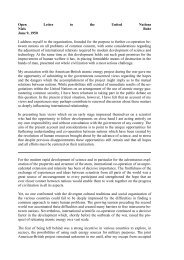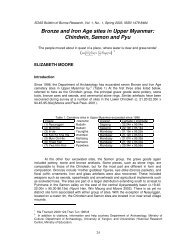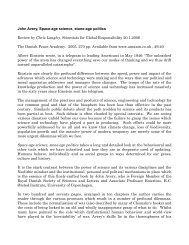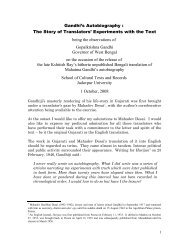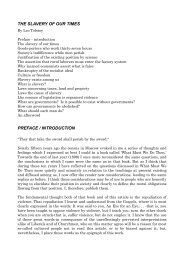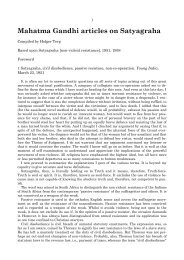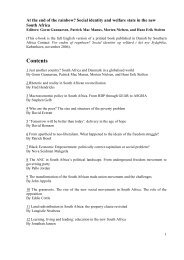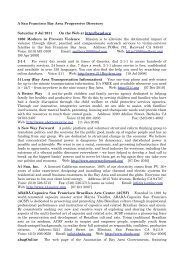- Page 1: SPACE-AGE SCIENCE AND STONE-AGE POL
- Page 6 and 7: 6 Science and Politics Figure 1: St
- Page 8 and 9: 8 Science and Politics of the enorm
- Page 10 and 11: 10 Science and Politics cuss in det
- Page 12 and 13: 12 Science and Politics would be re
- Page 14 and 15: 14 Science and Politics would be re
- Page 16 and 17: 16 Science and Politics atmosphere.
- Page 18 and 19: 18 Science and Politics
- Page 20 and 21: 20 Science and Politics members of
- Page 22 and 23: 22 Science and Politics view of the
- Page 24 and 25: 24 Science and Politics young water
- Page 26 and 27: 26 Science and Politics personal ga
- Page 28 and 29: 28 Science and Politics gain, but o
- Page 30 and 31: 30 Science and Politics Table 2.1:
- Page 32 and 33: 32 Science and Politics An accelera
- Page 34 and 35: 34 Science and Politics on the face
- Page 36 and 37: 36 Science and Politics of Armenian
- Page 38 and 39: 38 Science and Politics 17. Francis
- Page 40 and 41: 40 Science and Politics 63. J. Bowl
- Page 42 and 43: 42 Science and Politics 101. P. Mel
- Page 44 and 45: 44 Science and Politics 140. I. Eib
- Page 46 and 47: 46 Science and Politics
- Page 48 and 49: 48 Science and Politics global econ
- Page 50 and 51: 50 Science and Politics had been ou
- Page 52 and 53: 52 Science and Politics “What is
- Page 54 and 55:
54 Science and Politics At one poin
- Page 56 and 57:
56 Science and Politics the Balkan
- Page 58 and 59:
58 Science and Politics highly arme
- Page 60 and 61:
60 Science and Politics now unloade
- Page 62 and 63:
62 Science and Politics projects an
- Page 64 and 65:
64 Science and Politics 3. Elie Ked
- Page 66 and 67:
66 Science and Politics
- Page 68 and 69:
68 Science and Politics tence of ci
- Page 70 and 71:
70 Science and Politics looking for
- Page 72 and 73:
72 Science and Politics law of life
- Page 74 and 75:
74 Science and Politics Gandhi’s
- Page 76 and 77:
76 Science and Politics In January,
- Page 78 and 79:
78 Science and Politics injected ne
- Page 80 and 81:
80 Science and Politics of us becom
- Page 82 and 83:
82 Science and Politics revolution)
- Page 84 and 85:
84 Science and Politics is more, it
- Page 86 and 87:
86 Science and Politics
- Page 88 and 89:
88 Science and Politics Throughout
- Page 90 and 91:
90 Science and Politics slaughter,
- Page 92 and 93:
92 Science and Politics tains no sp
- Page 94 and 95:
94 Science and Politics under its j
- Page 96 and 97:
96 Science and Politics 1796, he fo
- Page 98 and 99:
98 Science and Politics According t
- Page 100 and 101:
100 Science and Politics Suggestion
- Page 102 and 103:
102 Science and Politics
- Page 104 and 105:
104 Science and Politics was discov
- Page 106 and 107:
106 Science and Politics The world
- Page 108 and 109:
108 Science and Politics lighter is
- Page 110 and 111:
110 Science and Politics “On the
- Page 112 and 113:
112 Science and Politics and stars.
- Page 114 and 115:
114 Science and Politics way. SDI c
- Page 116 and 117:
116 Science and Politics creating P
- Page 118 and 119:
118 Science and Politics need testi
- Page 120 and 121:
120 Science and Politics Paragraph
- Page 122 and 123:
122 Science and Politics deliberate
- Page 124 and 125:
124 Science and Politics 2. W. Brau
- Page 126 and 127:
126 Science and Politics 42. B. Rus
- Page 128 and 129:
128 Science and Politics 77. G. Bur
- Page 130 and 131:
130 Science and Politics 109. U.S.
- Page 132 and 133:
132 Science and Politics from starv
- Page 134 and 135:
134 Science and Politics (1983). Th
- Page 136 and 137:
136 Science and Politics humanity
- Page 138 and 139:
138 Science and Politics to the bor
- Page 140 and 141:
140 Science and Politics T. Ackerma
- Page 142 and 143:
142 Science and Politics Suggestion
- Page 144 and 145:
144 Science and Politics 32. G. Fuc
- Page 146 and 147:
146 Science and Politics 64. M. Hac
- Page 148 and 149:
148 Science and Politics 102. S.L.
- Page 150 and 151:
150 Science and Politics
- Page 152 and 153:
152 Science and Politics influence,
- Page 154 and 155:
154 Science and Politics Table 8.1:
- Page 156 and 157:
156 Science and Politics Table 8.3:
- Page 158 and 159:
158 Science and Politics bloody cou
- Page 160 and 161:
160 Science and Politics Figure 8.1
- Page 162 and 163:
162 Science and Politics most simul
- Page 164 and 165:
164 Science and Politics sponse to
- Page 166 and 167:
166 Science and Politics sible by t
- Page 168 and 169:
168 Science and Politics and Afghan
- Page 170 and 171:
170 Science and Politics must be ab
- Page 172 and 173:
172 Science and Politics for that m
- Page 174 and 175:
174 Science and Politics 33. C.J. C
- Page 176 and 177:
176 Science and Politics 69. G.H.W.
- Page 178 and 179:
178 Science and Politics 108. W.R.
- Page 180 and 181:
180 Science and Politics gifts from
- Page 182 and 183:
182 Science and Politics law. They
- Page 184 and 185:
184 Science and Politics revisions
- Page 186 and 187:
186 Science and Politics new values
- Page 188 and 189:
188 Science and Politics Some examp
- Page 190 and 191:
190 Science and Politics materials
- Page 192 and 193:
192 Science and Politics which I kn
- Page 194 and 195:
194 Science and Politics able suppo
- Page 196 and 197:
196 Science and Politics is a simpl
- Page 198 and 199:
198 Science and Politics lateral us
- Page 200 and 201:
200 Science and Politics Renewing t
- Page 202 and 203:
202 Science and Politics Who is Osa
- Page 204 and 205:
204 Science and Politics 11. Americ
- Page 206 and 207:
206 Science and Politics 46. W.J. K
- Page 208 and 209:
208 Science and Politics 80. J.L. S
- Page 210 and 211:
210 Science and Politics 115. S. No
- Page 212 and 213:
212 Science and Politics a legislat
- Page 214 and 215:
214 Science and Politics Traffic st
- Page 216 and 217:
216 Science and Politics devoted to
- Page 218 and 219:
218 Science and Politics authorized
- Page 220 and 221:
220 Science and Politics to stop an
- Page 222 and 223:
222 Science and Politics years, and
- Page 224 and 225:
224 Science and Politics The Nürem
- Page 226 and 227:
226 Science and Politics responsibi
- Page 228 and 229:
228 Science and Politics promise ne
- Page 230 and 231:
230 Science and Politics The Declar
- Page 232 and 233:
232 Science and Politics the power
- Page 234 and 235:
234 Science and Politics still cont
- Page 236 and 237:
236 Science and Politics 10. In con
- Page 238 and 239:
238 Science and Politics to let thi
- Page 240 and 241:
240 Science and Politics 32. F. Esa
- Page 242 and 243:
242 Science and Politics
- Page 244 and 245:
244 Science and Politics The condit
- Page 246 and 247:
246 INDEX Anti-individualist bias,
- Page 248 and 249:
248 INDEX Cancer and Agent Orange,
- Page 250 and 251:
250 INDEX Convention of 1792, 48 Co
- Page 252 and 253:
252 INDEX Ecstasy, 26 Ecumenical Co
- Page 254 and 255:
254 INDEX Fissile Materials Cutoff
- Page 256 and 257:
256 INDEX Herring gulls, 22 Hidden
- Page 258 and 259:
258 INDEX Internet, 196 Internet, a
- Page 260 and 261:
260 INDEX Müller, Adam, 50 Machiav
- Page 262 and 263:
262 INDEX Networks, 196 Neutral Cou
- Page 264 and 265:
264 INDEX Poison gas, use by Britis
- Page 266 and 267:
266 INDEX Rhineland, occupation of,
- Page 268 and 269:
268 INDEX South Africa’s nuclear
- Page 270 and 271:
270 INDEX UN Development Programme,
- Page 272:
272 INDEX Wild land fuels, 139 Zara




